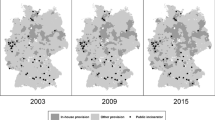Abstract
During the last decade waste management has been characterized by two main trends: the growth of international trade of waste materials and the introduction of extended producer responsibility (EPR) as a policy instrument. In this paper a two-country stylized model with imperfect competition in the recycling market is used to address two research questions. First, how do EPR recycling targets interact with other policy instruments such as taxes on recycling residues and excise duties? Second, how does strategic behavior of national policy makers influences the use of policy instruments? The model demonstrates that a combination of EPR with other instruments is needed to achieve the first-best outcome. When governments do not coordinate policies across borders, strategic behavior may lead to a ‘race to the bottom’ for taxes on recycling residues. Conversely, strategic behavior may lead to a counter-intuitive ‘race to the top’ for excise duties and EPR recycling targets. It is shown that these instruments are not only used to stimulate waste prevention but also to extract rents from foreign recyclers.


Similar content being viewed by others
Notes
Note that \({\partial \alpha }/{\partial \theta =1}\) if \(\theta =\alpha \) and \({\partial \alpha }/{\partial \theta =0}\) otherwise.
This approach is consistent with a two-stage game set up. In the first stage, Home and Foreign governments simultaneously choose policy instruments (disposal tax rates, excise duties and recycling rates) in a non-cooperative way. Given the outcome of this first stage game, market participants decide in the second stage on their optimal production levels in the product market and recycling market (Cournot oligopoly). The two-stage model is solved backwardly.
References
Aalbers R, Vollebergh H (2008) An economic analysis of mixing wastes. Environ Resour Econ 39:311–330
Acuff K, Kaffine DT (2013) Greenhouse gas emissions, waste and recycling policy. J Environ Econ Manag 65:74–86
Barrett S (1994) Strategic environmental policy and international trade. J Public Econ 54:325–338
Bio IS (2012) Use of economic instruments and waste management performances. Report for the European Commission DG ENV, Bio Intelligence Service, Paris
Calcott P, Walls M (2000) Can downstream waste disposal policies encourage upstream ‘Design for Environment’? Am Econ Rev 90:233–237
Calcott P, Walls M (2005) Waste, recycling and ‘Design for environment’: roles for markets and policy instruments. Resour Energy Econ 27:287–305
Cassing J, Kuhn T (2003) Strategic environmental policies when waste products are tradable. Rev Int Econ 11(3):495–511
Choe C, Fraser I (1999) An economic analysis of household waste management. J Environ Econ Manag 38:234–246
Dubois, M (2012) Extended Producer Responsibility for consumer waste: the gap between economic theory and implementation. Waste Manag Res 30(Suppl.9):36–42
Dubois M (2013) Towards a coherent European approach for taxation of combustible waste. Waste Manag 33:1766–1783
EEA (2011) Earnings, jobs and innovation: the role of recycling in a green economy. 8/2011, Copenhagen
EEA (2012) Movements of waste across the EU’s internal and external borders. 2012/7, Copenhagen
Ferrara I (2003) Differential provision of solid waste collection services in the presence of heterogeneous households. Environ Resour Econ 20:211–226
Fleckinger P, Glachant M (2010) The organization of extended producer responsibility in waste policy with product differentiation. J Environ Econ Manag 59:57–66
Fullerton D, Kinnaman TC (1995) Garbage, recycling and illicit burning or dumping. J Environ Econ Manag 29:78–91
Fullerton D, Wu W (1998) Policies for green design. J Environ Econ Manag 36:131–148
Kaffine D, O’Reilly P (2013) What have we learned about Extended Producer Responsibility in the past decade? A survey of recent EPR economic literature. Working paper for the OECD working party on resource productivity and waste
Kellenberg D (2012) Trading wastes. J Environ Econ Manag 64:68–87
Kennedy PW (1994) Equilibrium pollution taxes in open economies with imperfect competition. J Environ Econ Manag 27:49–63
Lindhqvist T, Lifset R (2003) Extended producer responsibility, can we take the concept of individual EPR from theory to practice? J Ind Ecol 7:3–6
Markusen JR, Mory ER (1995) Competition in regional environmnetal policies when plant locations are endogenous. J Public Econ 56:55–77
Matsueda N, Nagase Y (2012) An economic analysis of the packaging waste recovery system in the UK. Resour Energy Econ 34:669–679
Palmer K, Walls M (1997) Optimal policies for solid waste disposal: taxes, subsidies and standards. J Public Econ 65:193–205
Palmer K, Sigman H, Walls M (1997) The cost of reducing municipal solid waste. J Environ Econ Manag 33:128–150
Rijksoverheid NL (2011) Tax plan 2012 (translated from: Belastingsplan 2012: memorie van toelichting). pp 146
Requate T (2005) Environmental policy under imperfect competition—a survey. Economics working paper, CAU 2005–12
Rotter VS (2012) Waste management and producer responsibility: a score behind—a new ahead. Waste Manag Res 29:889–890
Runkel M (2003) Product durability and extended producer responsibility in solid waste management. Environ Res Econ 24:161–182
Sachs N (2006) Planning the funeral at the birth: extended producer responsibility in the European Union and the United States. Harvard Environ Law Rev 30:51–98
Sigman H (2002) International spillovers and water quality in rivers: do countries free ride? Am Econ Rev 93:1152–1159
Sigman H (2005) Transboundary spillovers and decentralization of environmental policies. J Environ Econ Manag 50:82–101
Vlaanderen (2011) Waste legislation 2011 (translated from Decreet van 2 juli 1981 betreffende de voorkoming en het beheer van afvalstoffen). art 47–53
Acknowledgments
We thank Herman Vollebergh, Yoko Nagase, Sandra Rousseau and Stef Proost for their valuable suggestions.
Author information
Authors and Affiliations
Corresponding author
Rights and permissions
About this article
Cite this article
Dubois, M., Eyckmans, J. Efficient Waste Management Policies and Strategic Behavior with Open Borders. Environ Resource Econ 62, 907–923 (2015). https://doi.org/10.1007/s10640-014-9851-3
Accepted:
Published:
Issue Date:
DOI: https://doi.org/10.1007/s10640-014-9851-3



